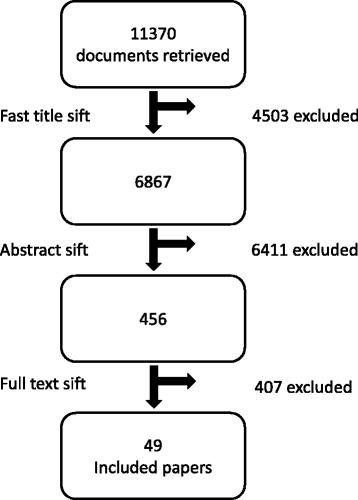Identifying inequitable healthcare in older people: systematic review of current research practice
- PMID: 28697768
- PMCID: PMC5505033
- DOI: 10.1186/s12939-017-0605-z
Identifying inequitable healthcare in older people: systematic review of current research practice
Abstract
Background: There is growing consensus on the importance of identifying age-related inequities in the receipt of public health and healthcare interventions, but concerns regarding conceptual and methodological rigour in this area of research. Establishing age inequity in receipt requires evidence of a difference that is not an artefact of poor measurement of need or receipt; is not warranted on the grounds of patient preference or clinical safety; and is judged to be unfair.
Method: A systematic, thematic literature review was undertaken with the objective of characterising recent research approaches. Studies were eligible if the population was in a country within the Organisation for Economic Co-operation and Development and analyses included an explicit focus on age-related patterns of healthcare receipt including those 60 years or older. A structured extraction template was applied. Extracted material was synthesised in thematic memos. A set of categorical codes were then defined and applied to produce summary counts across key dimensions. This process was iterative to allow reconciliation of discrepancies and ensure reliability.
Results: Forty nine studies met the eligibility criteria. A wide variety of concepts, terms and methodologies were used across these studies. Thirty five studies employed multivariable techniques to produce adjusted receipt-need ratios, though few clearly articulated their rationale, indicating the need for great conceptual clarity. Eighteen studies made reference to patient preference as a relevant consideration, but just one incorporated any kind of adjustment for this factor. Twenty five studies discussed effectiveness among older adults, with fourteen raising the possibility of differential effectiveness, and one differential cost-effectiveness, by age. Just three studies made explicit reference to the ethical nature of healthcare resource allocation by age. While many authors presented suitably cautious conclusions, some appeared to over-stretch their findings concluding that observed differences were 'inequitable'. Limitations include possible biases in the retrieved material due to inconsistent database indexing and a focus on OECD country populations and studies with English titles.
Conclusions: Caution is needed among clinicians and other evidence-users in accepting claims of healthcare 'ageism' in some published papers. Principles for improved research practice are proposed.
Keywords: Ageism; Disparity; Equity; Healthcare; Methodology.
Figures
References
-
- DHSS . Inequalities in health: Report of A Research Working Group (“The Black Report”) London: Department of Health and Social Security; 1980.
-
- Acheson D. Independent inquiry into inequalities in health report. London: Stationery Office; 1998.
-
- Marmot M, Allen J, Goldblatt P, et al. Fair society, healthy lives. Strategic review of health inequalities in England post-2010. London: UCL Institute for Health Equity; 2011.
-
- US Dept of Health and Human Services. Healthy People 2010 . Understanding and Improving Health. 2. Washington: US Government Printing Office; 2000.
-
- CSDH . Closing the gap in a generation: health equity through action on the social determinants of health. Final Report of the Commission on Social Determinants of Health. Geneva: WHO; 2008. - PubMed
Publication types
MeSH terms
Grants and funding
LinkOut - more resources
Full Text Sources
Other Literature Sources
Medical
Miscellaneous


